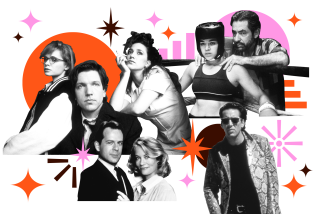‘Sanitizers’ of Home Video Lose in Court
- Share via
A federal judge has issued final cut to studios, ruling that companies that snip out potentially offending material from movies for home viewing violate copyright laws.
Businesses that edit sex, profanity and violence out of DVD and VHS copies in an appeal to some viewers’ tastes are “illegitimate,” said Richard P. Matsch of U.S. District Court in Denver.
Four companies that do so must stop and turn over their copies of expurgated films to Hollywood’s major studios.
“Audiences can now be assured that the films they buy or rent are the vision of the filmmakers who made them and not the arbitrary choices of a third-party editor,” Directors Guild of America President Michael Apted said in a statement.
The studios and several prominent directors -- including Steven Spielberg, Robert Altman and Steven Soderbergh -- have been fighting movie sanitizers in court since 2002, saying that retailers such as CleanFlicks had no right to copy and distribute their own versions.
Retailers asserted that their cleaned-up copies made fair use of the movies under copyright law and that they bought one copy of the original for each modified version they rented or sold. That ensured more sales and exposure than such movies would have received had they not been edited to be more wholesome, the retailers argued.
“We’re disappointed,” CleanFlicks Chief Executive Ray Lines said. “This is a typical case of David versus Goliath, but in this case, Hollywood rewrote the ending. We’re going to continue to fight.”
As many as 90 video stores nationwide -- about half of them in Utah, where CleanFlicks is based -- purchase movies from his company, Lines said.
The owner of the four CleanFlicks shops in Utah County, Daniel Thompson, told the Deseret Morning News of Salt Lake City: “I think it’s ridiculous that you can’t watch a movie without seeing sex, nudity or extreme violence. I don’t understand why they’re trying to keep that in there.”
The dispute is about artistic integrity, said Apted, who directed “Coal Miner’s Daughter.”
“Directors put their skill, craft and often years of hard work into the creation of a film,” he said in the statement. “So we have great passion about protecting our work, which is our signature and brand identification, against unauthorized editing.”
Other retailers named in Matsch’s ruling Thursday and ordered to cease their editing were Family Flix USA, CleanFilms and Play It Clean Video. The ruling does not affect other movie sanitizers, which use computer programs to electronically edit by skipping and muting portions of films while leaving the original DVD intact.
Salt Lake City-based ClearPlay, for instance, sells DVD players that can be set to screen out varying degrees of violence, sex and profanity, depending on viewer preferences.
The censorship controversy began in 1998, when the owners of a Utah theater abbreviated the movie “Titanic” by removing scenes of actress Kate Winslet topless and in a passionate interlude with Leonardo DiCaprio.
Paramount Pictures pulled the movie from the theater and later protested to a Utah video shop that edited the film.
*
The Associated Press was used in compiling this report.
More to Read
The biggest entertainment stories
Get our big stories about Hollywood, film, television, music, arts, culture and more right in your inbox as soon as they publish.
You may occasionally receive promotional content from the Los Angeles Times.











